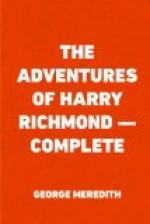My father brought horses from England, and a couple of English grooms, and so busy an air of cheerfulness, that I had, like a sick invalid, to beg him to keep away from me and prolong unlimitedly his visit to Sarkeld; the rather so, as he said he had now become indispensable to the prince besides the margravine. ‘Only no more bronze statues!’ I adjured him. He nodded. He had hired Count Fretzel’s chateau, in the immediate neighbourhood, and was absolutely independent, he said. His lawyers were busy procuring evidence. He had impressed Prince Ernest with a due appreciation of the wealth of a young English gentleman, by taking him over my grandfather’s mine.
’And, Richie, we have advanced him a trifle of thousands for the working of this coal discovery of his. In six weeks our schooner yacht will be in the Elbe to offer him entertainment. He graciously deigns to accept a couple of English hunters at our hands; we shall improve his breed of horses, I suspect. Now, Richie, have I done well? I flatter myself I have been attentive to your interests, have I not?’
He hung waiting for confidential communications on my part, but did not press for them; he preserved an unvarying delicacy in that respect.
‘You have nothing to tell?’ he asked.
‘Nothing,’ I said. ‘I have only to thank you.’
He left me. At no other period of our lives were we so disunited. I felt in myself the reverse of everything I perceived in him, and such letters as I wrote to the squire consequently had a homelier tone. It seems that I wrote of the pleasures of simple living—of living for learning’s sake. Mr. Peterborough at the same time despatched praises of my sobriety of behaviour and diligent studiousness, confessing that I began to outstrip him in some of the higher branches. The squire’s brief reply breathed satisfaction, but too evidently on the point where he had been led to misconceive the state of affairs. ’He wanted to have me near him, as did another person, whom I appeared to be forgetting; he granted me another year’s leave of absence, bidding me bluffly not to be a bookworm and forget I was an Englishman.’ The idea that I was deceiving him never entered my mind.
I was deceiving everybody, myself in the bargain, as a man must do when in chase of a woman above him in rank. The chase necessitates deceit—who knows? chicanery of a sort as well; it brings inevitable humiliations; such that ever since the commencement of it at speed I could barely think of my father with comfort, and rarely met him with pleasure. With what manner of face could I go before the prince or the margravine, and say, I am an English commoner, the son of a man of doubtful birth, and I claim the hand of the princess? What contortions were not in store for these features of mine! Even as affairs stood now, could I make a confidant of Temple and let him see me through the stages of the adventure? My jingling of verses, my fretting about the signification of flowers, and trifling with symbols, haunted me excrutiatingly, taunting me with I know not what abject vileness of spirit.




